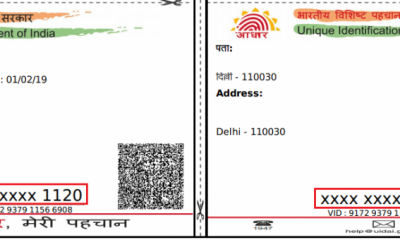Trading
Top 5 Financial App Development Ideas

Financial apps are a big part of the FinTech revolution. They make managing money simpler, smarter, and more convenient. Whether it’s budgeting, investing, or tracking expenses, apps are giving people tools to take control of their finances. However, the best financial apps solve real problems in creative ways that are easy to use. Below are five app ideas that focus on helping people save, invest, and spend wisely, all while keeping things simple for everyday users.
1. A Simple Budgeting App
A budgeting app can help people see where their money goes and teach them how to save. The app would automatically track spending and divide it into categories like food, bills, and entertainment. It could also suggest a spending limit for each category to help users stay on track. Notifications would alert them if they’re spending too much in one area. Another cool feature could be rounding up purchases and saving the spare change. For example, if you buy something for $4.75, the app could save the extra $0.25 for you. It’s an easy way to build better money habits.
2. A Group Investment App
This app idea allows people to invest together in things like small businesses, local projects, or real estate. Users could pool their money and choose projects they believe in, with clear details on risks and potential returns. The app would also include a social aspect, where users can discuss investments or follow others’ activity. It could have learning tools to teach new investors about managing risk and understanding returns. By bringing people together, this app would make investing feel more approachable and fun, even for those with smaller budgets.
3. A Financial Overview App
Managing multiple accounts, checking, savings, credit cards, and loans can feel overwhelming. A financial overview app would put everything in one place. Using tools like open banking, the app securely connects to different banks and shows users their complete financial picture. If you’re wondering what is open banking, it’s a system that allows banks to share financial data with apps, but only if the user agrees. This data makes it possible to show spending trends, upcoming bills, and savings progress. With everything in one app, users can make smarter decisions about their money without jumping between multiple platforms.
4. A Beginner-Friendly Investing App
Investing can be scary for beginners, but this app would make it simple. Users could start with just a few dollars by rounding up spare change from purchases or setting aside small amounts. The app could explain investment options like stocks or bonds in plain language. Users could even choose pre-set portfolios based on their goals, like saving for college or buying a car. The app would show progress and offer tips to help users make informed decisions. This idea makes investing easy and shows that you don’t need to be rich to start growing your money.
5. A Subscription Tracker
These days, people have so many subscriptions—Netflix, Spotify, gym memberships, and more. It’s easy to lose track of how much you’re spending. A subscription tracker app would keep everything organized, showing what you’re subscribed to and how much you’re paying each month. It could send reminders when free trials are about to end or let users cancel subscriptions they don’t use anymore. The app could also show how much you spend on subscriptions compared to other expenses, helping users decide where to cut back. This app would save time and money and prevent surprises on your credit card bill.
Trading
Quickness is Key in the Trading Market

Efficiency and quickness are king in the cryptocurrency trading industry. Traders like the stability and liquidity of Tether (USDT), a stablecoin tied to the US dollar. For active traders, the ability to purchase USDT instantaneously is a huge boon, as it allows them to optimize their trading methods and react swiftly to market movements. This article delves into the advantages of buying USDT instantly for active traders, highlighting how it can give them a strategic edge, more flexibility, and quickness.
Having lightning-fast transaction processing speeds is a game-changer in bitcoin trading. The market is very unpredictable, and prices can shift a lot in a matter of seconds. Traders can seize ephemeral opportunities with the agility that comes with instant USDT purchases.
Traders can jump into the market at the perfect time with the ability to buy USDT instantly. Taking advantage of market changes in the near term requires this level of speed. When you purchase low on one exchange and sell high on another, you’re engaging in arbitrage trading. Because there is less time between transactions when buying anything instantly, traders might use it to their advantage when implementing arbitrage methods. Unpredictable price swings are possible in response to market news and occurrences. Traders may respond swiftly to news by purchasing USDT instantly, allowing them to modify their holdings to take advantage of new information.
The Ability to Adjust Trading Approaches
Trades can be executed using a variety of tactics thanks to instant USDT purchases. Traders that are actively involved in the market and who must respond quickly to shifting situations need this flexibility.
The goal of the trading method known as “scalping” is to capitalize on small price changes by making multiple little trades. If you’re a scalper who needs to make transactions fast to pocket these tiny gains, then instant purchases are for you.
Trading assets buy and sell inside the same trading day is known as day trading. With the ability to buy USDT instantly, day traders can enter and exit positions quickly, increasing their chances of success.
Traders frequently employ hedging tactics to shield their portfolios from unfavourable price fluctuations. A safety net against possible losses can be quickly constructed by instant purchases, which allow for hedging actions.
Improved Access to Funds
One reason USDT is appealing to active traders is its reputation for strong liquidity. This liquidity is further improved by instant purchases, which provide traders instant access to money whenever they need it.
- Efficient Trading Process: The ability to execute deals with little to no price slippage is a hallmark of a market with high liquidity. Quick access to USDT through instant purchases helps make trading easier.
- Quickly Accessible Capital: To make sure they have the money to take advantage of trading opportunities when they arise, traders can use rapid purchases to turn their fiat cash into USDT.
- Preventing Price Slippage: When a trade is delayed from being initiated to being executed, a less favorable price is known as price slippage. Reduced transaction timeframes made possible by instant transactions lessen this danger.
The instantaneous purchase of USDT improves market efficiency and makes trading easier.
Improving Uptime
Missed opportunities and possible losses might result from downtime for aggressive traders. To keep traders engaged in the market at all times, instant USDT purchases assist minimize downtime.
Traders may be active in the market all the time with instant purchases, which lowers the chance of losing out on lucrative trades. Traders can better manage their capital and keep it available for trading if downtime is reduced.
Reassurance and Safety
Traders may rest easy knowing their money is safe when they buy USDT instantly because of the added security features.
By minimizing the amount of time their money is left vulnerable to possible market swings, traders can mitigate the risk of negative price movements through quick transactions. The safety and security of transactions is guaranteed by the sophisticated security measures implemented by several sites that enable quick purchasing.
Quick and Easy Ways to Buy USDT
The following are some suggestions for active traders who want to get the most out of their quick USDT purchases:
Pick an honest exchange
It is critical to choose a trustworthy cryptocurrency exchange that provides quick USDT purchasing. You should only do business with reputable exchanges that have a history of safe transactions and excellent support.
Verify that the exchange safeguards your money and personal details using cutting-edge security protocols like encryption and two-factor authentication (2FA).
Locate the most cost-effective exchange by comparing their transaction fees.
Take a look at what other people are saying: Ratings and reviews left by actual users can tell you a lot about the trustworthiness and efficiency of the exchange.
Keep an eye on the market
In order to make educated trading decisions, it is crucial to monitor market circumstances. To predict price changes and execute smart trades, use market analysis tools and keep yourself updated with the newest news.
Apply techniques for minimizing risk
Trading successfully requires effective risk management. To safeguard your investments, employ risk management strategies such as stop-loss and take-profit orders.
- Place Orders for Stop-Loss: If the asset’s price drops below a specified level, a stop-loss order will sell it automatically, allowing you to reduce losses.
- Pursue Orders for Profit: To lock in profits before the market changes, put up a take-profit order to sell your asset automatically when its price hits a specified level.
Shift your Investment allocation
One of the best ways to minimize loss and maximize profit is to diversify your investments. To keep your portfolio diversified, think about holding a variety of cryptocurrencies as well as stablecoins such as USDT.
Keep up-to-date and learning
To keep up with the ever-changing world of bitcoin trading, continuous learning is essential. If you want to become a better trader, you should stay up-to-date on industry news, join trading forums, and use instructional tools.
USDT Summarizing
For active traders, buying USDT instantly provides many advantages, such as better security, less downtime, faster market access, and more liquidity. Traders can enhance their trading efficiency, seize market opportunities, and achieve better trading outcomes by utilizing these advantages.
In order to get the most out of buying USDT instantly, you need to do a few things: find a trustworthy exchange, keep an eye on the market, diversify your holdings, and employ good risk management techniques. By implementing these practices, active traders may confidently and successfully navigate the bitcoin market.
Trading
How to Use Currency Pair Correlations Strategy in Trading

If you’re a fast trading aficionado, you might be on the hunt for fresh strategies to skyrocket your gains and slash your losses. You might have heard of or already used some strategies, such as technical analysis, fundamental analysis, or trend following. But have you ever heard of currency pair correlations?
Currency pair correlations are like the secret sauce of the financial world, revealing the intricate dance moves of different currencies as they tango with each other. By mastering their usage, you can unleash a formidable strategy that will turbocharge your trading prowess and sprinkle a dash of diversity into your investment portfolio.
This article will show what currency pair correlations are, how they work, and how to use them to your advantage. We will also show you how to trade pairs with positive and negative correlations and how to avoid some common mistakes. After reading this piece, you’ll have a new trading tool to help you reach your goals.
What are Currency Pair Correlations?
To understand currency pair correlations, let’s use a simple analogy.
Imagine that you have two friends, Alice and Bob, who always go to the same parties. Whenever Alice shows up, Bob is likely to show up too. And Bob will likely stay home whenever Alice doesn’t show up. In other words, Alice and Bob have a positive correlation: they tend to move in the same direction.
Now imagine you have another friend, Charlie, who has a different taste in parties. Whenever Alice shows up, Charlie is likely to stay home. And whenever Alice doesn’t show up, Charlie is expected to show up. In other words, Alice and Charlie have a negative correlation: they tend to move in opposite directions.
The same logic applies to currency pairs. Some currency pairs move in the same direction, while others move in opposite directions. This is because economic conditions, interest rates, political events, and market sentiment can all have a similar or opposite effect on both.
For example, the EUR/USD and the GBP/USD tend to have a positive correlation; they usually move in the same direction. This is because the monetary policy of the European Central Bank, the Brexit negotiations, and the COVID-19 situation in Europe all have an impact on both the euro and the pound.
On the other hand, the USD/CHF and the EUR/USD tend to have a negative correlation; they usually move in opposite directions. This is because the Swiss franc is considered a safe-haven currency that attracts investors during times of uncertainty or risk aversion, while the euro is seen as a riskier currency that benefits from optimism or risk appetite.
How to Trade Positive and Negative Correlation Pairs
Knowing how currency pairs correlate can help you improve your trading strategy in several ways. Here are some of them:
- You can diversify your portfolio by choosing pairs with low or no correlation, reducing your exposure to market fluctuations, and avoiding putting all your eggs in one basket.
- Selecting pairs with a negative correlation allows you to reduce risk. As a result, you can hedge your bets against price declines and mitigate potential losses.
- You can double your profits by choosing pairs that have a positive correlation. This way, you can amplify your gains by taking advantage of similar price movements.
However, before you start trading correlation pairs, you need to be aware of some essential points:
- Correlation is not constant; it can change over time due to various factors. Therefore, you must regularly monitor the correlation coefficients and adjust your strategy accordingly.
- Correlation is not causation; it does not imply that one currency causes another to move. Therefore, you need to analyze the underlying factors that affect each currency and not rely solely on correlation.
- Correlation is imperfect; it does not mean that two currencies will always move exactly in sync or oppositely. Therefore, you must use other indicators and tools to confirm signals and manage risk.
How to Minimize Losses and Maximize Profits
While using correlations between currency pairs can significantly improve your trading results, doing so is not without its challenges and limitations. Here are some tips on how to overcome them:
Use stop-loss orders
When the price reaches your predetermined target against losses, these orders will trigger and close your position immediately. You can use them to hedge your trades against large price swings and protect your investment capital.
Use take-profit orders
These orders automatically close your position when the price reaches a certain level. They can help you lock in your profits and avoid missing out on favorable price movements.
Use trailing stop-loss orders
These are orders that automatically adjust your stop-loss level according to the price movement. You can reduce your risk while increasing your profits by using them to stay on trend.
Use multiple time frames
These are different charts that show the price movement over different periods. You can use them to spot long-term patterns, intermediate shifts, and short-term opportunities.
Conclusion
Currency pair correlations are a powerful strategy that can help you improve your trading performance and diversify your portfolio. By knowing how to use them, you can trade positive and negative correlation pairs, hedge your positions, double your profits, and minimize your losses.
However, currency pair correlations are not infallible and can change over time. Therefore, you should use them cautiously and with other strategies and tools, such as technical and fundamental analysis.
The best way to master currency pair correlations is to practice them in a demo account, where you can test your skills and learn from your mistakes without risking real money. You will improve as a trader by gaining the self-assurance that comes with experience.
Trading
How Traders Can Get Big Returns From Day Trading
In the trading business, there is an old proverb that goes something like this: “You need to risk more to make more.” That is not at all the case. Rather, traders should strive to incur fewer risks with each transaction in order to improve their earnings over time.
The majority of people trade risk in the wrong manner. Long-term returns are more likely to be high when just a small fraction of the account balance is at risk with each transaction, such as 1% of the account value.
To put it another way, no matter how skilled a trader grows, he or she will experience losses. When you take on more risk in each transaction, your “risk of ruin” rises, meaning you might lose all of your funds.
If you only invest 1% of your entire account value in each transaction, you are unlikely to lose all of your money. However, how you employ that one percent is essential. Taking a 1% risk on a $10,000 portfolio does not imply naively acquiring $100 in shares (or other assets). Alternatively, you may make the most of your money by setting a 1% stop-loss and profit target.
Risk/Reward Ratio
Determine how much money you’re willing to put at risk before determining how to invest it. Before you begin, you must choose your entry point, stop-loss level, and profit target. XYZ stock is now trading at $17.15. Your $10,000 short selling account is now worth $17.11. If you put 1% of your money at risk, you might lose $100. You decide to set a stop-loss of $17.22 for your day trade based on the stock chart. The risk per share is calculated by dividing $0.11 ($0.11) by 100, yielding 909. You may short sell up to that amount of shares (position size).
A price chart may also assist you in determining a suitable profit objective. Based on your initial position, you may earn $0.41. In other words, the risk/reward ratio is 0.27, which is $0.11. It’s just a fifth of what you might have made. Using a stop-loss assures that you won’t lose more than 1% of your account balance, but winning your trade will earn you close to 4% of your account balance profit (because you risked 1 percent, and your potential profit is close to four times your risk). Furthermore, those investors who wish to make a large return on a little amount of money frequently pick accounts with a low minimum deposit, such as Cent and Micro accounts. As we can see from the FBS broker review, there are various brokers that enable investors to utilize the aforementioned accounts to earn money with a modest amount of money. FBS is an example of one of these brokers. Investors may learn more about how brokerages enable them to generate service fees, trading platforms, and so on via reviews.
A 4% increase in account equity for a single transaction is a significant chunk of money. If we make a few excellent purchases each year, we’ll earn more money than most investors in a year, but our risk is still modest and manageable.
Despite the near-zero risk of disaster, it is feasible to make significant gains.
However, the risk/reward ratio isn’t the only thing to think about. If the profit objective is exceptionally difficult to achieve, a very high risk/reward ratio is of limited use. This is where the bulk of traders go wrong. In their opinion, a risk-to-reward ratio of 0.1 is superior to a 0.75 one. However, this is not always the case. Your stop-loss and goal should be determined by the most recent price activity, not by your hopes and dreams for your trades.
Risk/reward ratios of less than 0.5 are ideal, but make sure that the profit objective remains achievable as the risk/reward ratio decreases. If you establish unrealistic profit objectives that never materialize, your chances of being stopped out (i.e. losing) on a trade increase.
Demo account practice may assist you in determining what win rate (chance of profit) and risk/reward ratios are ideal for your trading style.
How Does Day Trading Work?
Only a few years ago, the online market was available to workers of significant financial institutions, brokerages, or trading houses who could actively participate. The typical citizen may now engage in the stock market via online trading.
Day trading has the ability to generate a lot of money for you (as long as you do it properly). As a beginner, it’s critical to have a clear approach, but this might be difficult for those who don’t have one. Even the most seasoned day traders have had their fair share of setbacks throughout their careers. What exactly is day trading, and how does it operate?
“Short-term trading” is one of the most prevalent expressions used to describe “day trading” in financial markets. Any market may be impacted, but the currency and stock markets are the most prevalent. The vast majority of day traders are well-educated and financially secure. To capitalize on tiny price movements in highly liquid shares or currencies, large leverage and short-term trading strategies are used.
Short-term market swings may be forecasted by day traders. The utilization of current events as a basis for trading is rather common. It is critical to remember this in order to comprehend how scheduled releases such as economic data, business profitability, and interest rates are influenced by market expectations and market psychology. When expectations are not fulfilled or surpassed, the market reacts violently, which may be highly beneficial to day traders.
-

 Apps5 years ago
Apps5 years agoHow to Book an Ola or Uber Using Google Maps
-

 Internet5 years ago
Internet5 years agoHow to Download a Copy of Your Aadhaar Card
-
Sports3 years ago
10Cric India Bookmaker Review for Betting on Sports Online in 2022
-

 Apps5 years ago
Apps5 years agoHow to Install WhatsApp Beta for Windows Mobile or Windows Phone
-
Android Games5 years ago
LDPlayer vs Nox Player: Powerful Android Emulator for Gaming
-

 How to5 years ago
How to5 years agoJio Fiber Landline Service: How to Activate Jio Home Phone aka JioFixedVoice for Free Calling
-

 How to5 years ago
How to5 years agoHow to Increase Followers on Instagram for Real
-

 How to5 years ago
How to5 years agoWhatsApp Web: Everything You Need to Know




